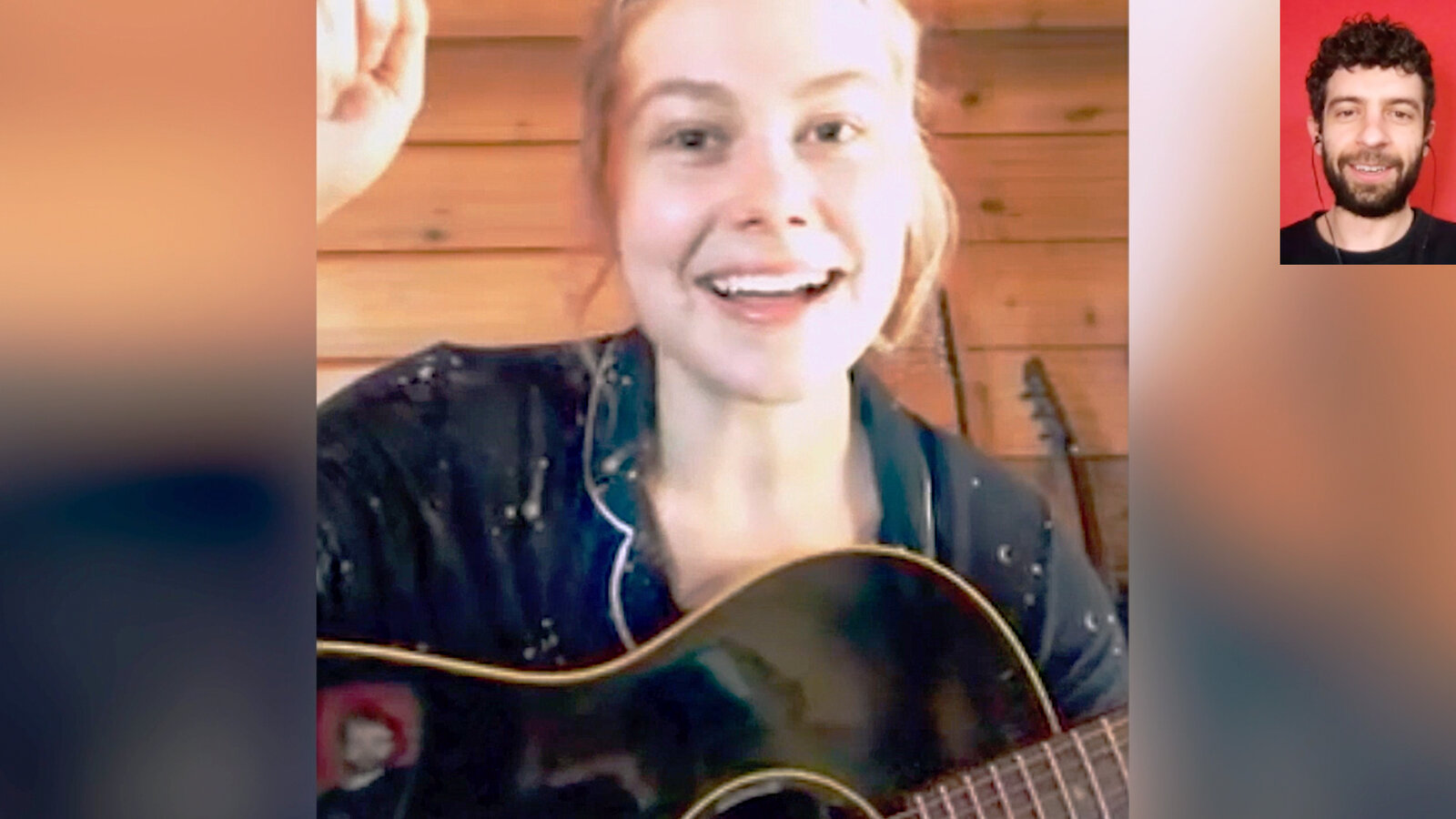Advertisement
Diary of a Song
The singer and songwriter prefers a ballad. But collaborators yanked her out of her comfort zone for “Kyoto,” a breakout from her latest acclaimed album. Here’s how she made it.
transcript
0:00/9:12
-0:00
transcript
The 25-year-old singer and songwriter shows us how “Kyoto” transformed from a ballad into a rock song over months, combining a stray lyric, a bare-bones voice memo from tour and shared memories of childhood.
-
“Hey.” “Hey. Can you hear me?” “Yeah. I had the ‘I’m going to kill you’ line already, I think from a song I was trying to write about fentanyl. And then I was like, actually that kind of works. And it started as a ballad.” Singing: “I’m going to kill you if you don’t beat me to it. Born under Scorpio skies.” “The first thing that I notice when I listen to Phoebe’s music is the writing itself.” Singing: “Day off in Kyoto. Got bored at the temple. Looked around at the 7-Eleven.” “She’ll literally write two lines, and then she’ll wait months just for the perfect next line.” Singing: “You called me from a pay phone — they still got pay phones, it cost $1 a minute — to tell me you’re getting sober and you wrote me a letter, but I don’t have to read it.” “Phoebe’s like magical power. It’s just like these incredibly somber and gorgeous songs that are also hilarious.” “You write a lot of very slow —” Singing: “Can the killer in me —” “— very rip your heart out and stomp on it ballads.” Singing: “Jesus Christ, I’m so blue all the time.” “It’s easy for me to do. I think that’s just the way that they sound when I play them solo.” “Where did the idea for ‘Kyoto’ start?” “I think it’s like a collage chopped up into one experience. Like, I literally got home from tour. And then Marshall and I were talking about our dads and their similarities.” “Our dads both had beers in their laps and were like, ‘You want to learn how to drive?’ Like that kind of thing. And we were both laughing about that. We’re like, ‘What the hell is wrong with these guys?’” Singing: “He said you called on his birthday. You were off by like 10 days, but you get a few points for trying.” “It’s just about that complex relationship that you can never kind of get rid of. Wanted to see the world through your eyes, and then it happened. And I changed my mind.” “She just found this way to sing heartbreaking stuff in an alluring way. And that’s really been kind of the story of her career, I think.” “I had been playing since I was a teenager once or twice a month. And then when I graduated high school, it was just constant. And I thought that’s what it was.” “I signed Beck 25 years ago. This was the first time since that, that I heard one song and said, ‘OK, I’m in.’” “I’d met a lot of producers that were like, I’m going to put a trap beat over your voice. And Tony was the first producer I met — I think he’s the reason that my music sounds the way it does.” “The first album was mostly me, Ethan and Phoebe. “‘Stranger in the Alps’ was the first record I got to be a real producer on.” Singing: “You, you must’ve been looking for me.” “We became the Trilemma, as we call ourselves.” “I had no idea what my music sounded like before I started the first album. And then by the time I finished, I was like, ‘Oh.’ And that’s how we started this record.” “We had started maybe tracking four or five songs at this point in the record.” “But there was a problem, and that was Phoebe is very drawn to slow tempo stuff.” “All of us were like, we do need to have some tempo. And Phoebe was like, I have a new song.” Singing: “Day off in Kyoto. Got bored at the temple. Looked around at the 7-Eleven. So slow.” “Sounds like a Phoebe Bridgers song.” “Totally.” “I said, ‘Look, this song is great, and the lyrics are incredible.’ But I said, ‘Look, let’s speed this up. Let’s let it rock.’” “‘Motion Sickness’ was, I think, one of the more beloved songs off of that first record.” Singing: “I have emotional motion —” “This song, I think, we wanted to do a similar thing: Give it some tempo, give it some energy.” “And I was like, ‘Let’s go. Let’s do it.’” Singing: “Day off in Kyoto. Got bored at the temple. Looked around at the 7-Eleven.” “I think we were all like — smiling at each other, realizing it was working and just like —” “There are definitely times where you take slower, sadder ones, and you start playing them, and they lose, like the chorus all of a sudden feels flat. This one seemed to really like being a rocker.” “Ethan on pocket piano, which is the thing that plays the — Singing: “Doo, doo, doo, doo, doo.” “I was almost thinking in my head, which is often the case, I’m probably playing something that I need to make cooler, like it’s probably lame. And Phoebe and Chris were like, ‘That’s really cool.’” “That’s classic Ethan [expletive].” “And then the trumpet idea — Phoebe was like, ‘I want horns.’” “It’s kind of at odds with a rock band to me, but when it’s done right, it’s incredible.” “I thought, this is the last time I’m ever going to play trumpet.” “Oh, no.” “I had been dealing with this tooth problem. We started doing takes of ‘Kyoto.’” “He didn’t tell anybody in the studio that he had chipped his front tooth. So playing was excruciating.” “Where were you on the smiley face pain chart?” “Somewhere between 8 and 1/2 and 9.” “We made him do it a million times.” “And you had no idea.” “We had no — I feel so bad.” “There was a lot of trumpet to record.” [trumpet playing] “I felt like it really felt like a song when I recorded the backing vocals. I’m going to — I thought that was so fun.” “In the tradition of people like John Lennon, who could write a profoundly sad lyric and play it as an up-tempo song, she did that with that song. And it was, I think, really effective because you’re very seduced by its tempo, by its rollicking nature. And then you start singing the song. You find yourself going, ‘Oh no, this is terrible.’ And it’s great. That’s a device she employs, and she employs it effectively.” “And only a few times per album.” “But when it happens, man, pow!” Singing: “I wanted to see the world. Then I flew over the ocean, and I changed my mind. Whew.” “I don’t think about all my songs as ballads anymore. I feel like they’re not even really fully written until I’ve shown them to those guys. And they’re like, ‘This stays a ballad,’ or ‘This is a rock song.’” “It’s going to be an important song for the record.” “And I changed my mind. That’s very Tony, too, to throw this in there.” [strums guitar] “How about when she screams at the end of ‘I Know.’ I’ll send you a video of her doing it.” “I wanted to be able to hit a really raspy Conor Oberst or Haley Dahl scream, because I love it in music.” “Did you have to teach yourself how to scream?” “I thought I did. And I asked Conor to come to the studio the day that I was screaming. And he was like, ‘What? You just have to scream.’” [screaming] [screaming] [screaming] [humming] “I just had this idea that I wanted it to bounce.” Singing: “I got the horses in the back.” – [humming] [snapping fingers] Singing “Man, what’s the deal? Man, I’m coming through. It’s your girl, Lizzo. [laughs]”

When Phoebe Bridgers, the 25-year-old singer and songwriter from Los Angeles, has the first inklings of a musical idea, it’s usually in the form of a ballad — slow and somber, but with enough wry energy to keep it interesting.
Most of the time — including across Bridgers’s 2017 debut, “Stranger in the Alps,” and its follow-up from this year, “Punisher” — the songs stay that way: quiet, slow, dreamy. But sometimes, Bridgers’s reliable band of collaborators can convince her to add some pep to a track, if only to disguise its melancholy.
That’s the story of “Kyoto,” the first straight-ahead indie rock song on “Punisher,” one of the most critically acclaimed albums of the year so far. Writing in The New York Times, the critic Lindsay Zoladz called it “strange and exquisitely moving,” noting Bridgers’s “great strength as a songwriter: weaving tiny, specific, time-stamped details (chemtrails, Saltines, serotonin) into durable big-tent tapestries of feeling.”
In the latest episode of Diary of a Song, which breaks down how music is made today, Bridgers discusses how “Kyoto” came together over the span of months, combining a stray lyric, a bare-bones voice memo from tour and shared memories of childhood with her drummer and co-writer Marshall Vore. And while the song started as a trademark Bridgers dirge, she says, it reached its final form only once she was in the studio with her fellow producers on “Punisher,” Ethan Gruska and Tony Berg, who helped establish her sound on her first album.
“I don’t think about all my songs as ballads anymore,” Bridgers said. “I feel like they’re not even really fully written until I’ve shown them to those guys, and they’re like, ‘This stays a ballad,’ or, ‘This is a rock song.’”
In addition to interviews with Bridgers, Vore, Gruska and Berg, the video above features various demo versions of the song in-progress and the story of how the triumphant horns in “Kyoto” almost ended the musician and composer Nate Walcott’s career as a brass player.
“Diary of a Song” provides an up-close, behind-the-scenes look at how pop music is made today, using archival material — voice memos, demo versions, text messages, emails, interviews and more — to tell the story behind the track. Subscribe to our YouTube channel.
